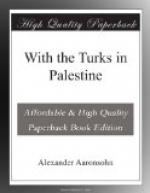This was arranged in short order, although I am healthy-looking and the doctor found some difficulty in hitting on an appropriate ailment. Finally he decided that I had “too much blood”—whatever that might mean. With his certificate in hand, I paid the regular price of two hundred dollars from funds which had been sent me by my family, and walked out of the barracks a free man. My happiness was mingled with sadness at the thought of leaving the comrades with whom I had suffered and hoped. The four boys from my village were splendid. They felt that I was right in going home to do what I could for the people, but when they kissed me good-bye, in the Eastern fashion, the tears were running down their cheeks; and they were all strong, brave fellows.
On my way back to Zicron-Jacob, I passed through the town of Sheff’amr, where I got a foretaste of the conditions I was to find at home. A Turkish soldier, sauntering along the street, helped himself to fruit from the basket of an old vender, and went on without offering to pay a farthing. When the old man ventured to protest, the soldier turned like a flash and began beating him mercilessly, knocking him down and battering him until he was bruised, bleeding, and covered with the mud of the street. There was a hubbub; a crowd formed, through which a Turkish officer forced his way, demanding explanations. The soldier sketched the situation in a few words, whereupon the officer, turning to the old man, said impressively,—“If a soldier of the Sultan should choose to heap filth on your head, it is for you to kiss his hand in gratitude.”
CHAPTER V
THE HIDDEN ARMS
When I finally reached Zicron-Jacob, I found rather a sad state of affairs. Military law had been declared. No one was supposed to be seen in the streets after sundown. The village was full of soldiers, and civilians had to put up with all kinds of ill-treatment. Moreover, our people were in a state of great excitement because an order had recently come from the Turkish authorities bidding them surrender whatever fire-arms or weapons they had in their possession. A sinister command, this: we knew that similar measures had been taken before the terrible Armenian massacres, and we felt that some such fate might be in preparation for our people. With the arms gone, the head men of the village knew that our last hold over the Arabs, our last chance for defense against sudden violence, would be gone, and they had refused to give them up. A house-to-house search had been made—fruitlessly, for our little arsenal was safely cached in a field, beneath growing grain.
It was a tense, unpleasant situation. At any time the Turks might decide to back up their demand by some of the violent methods of which they are past masters. A family council was held in my home, and it was decided to send my sister, a girl of twenty-three, to some friends at the American Syrian Protestant College at Beirut, so that we might be able to move freely without the responsibility of having a girl at home, in a country where, as a matter of course, the women-folk are seized and carried off before a massacre. At Beirut we knew that there was an American Consul-General, who kept in continual touch with the battleship anchored in the harbor for the protection of American interests.




